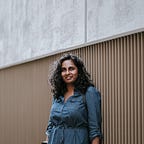LAAPFF 2022: ‘The Chemical Factory,’ ‘Man Brows’ and ‘Free Chol Soo Lee’
This coverage is part of the 38th Los Angeles Asian Pacific Film Festival.
‘The Chemical Factory’ (2021) Review: The Retellings of a Harrowing Past
Andrew Leung’s A Chemical Factory is an animated documentary that follows the life of a Chinese immigrant mother (voiced by Cheuk Yee Chan), who recounts her life during the 1960s communist China to her American son (voiced by Andrew Leung). The short film takes place during the beginning of the COVID-19 pandemic and it is narrated by the mother, describing the anxiety of her childhood, the pandemic, as well as the violence perpetrated against the Asian community in America.
The film follows a young Asian-American man listening to his mother’s voice messages, as she tells him to be careful about the impending pandemic. At the same time, the mother and the son record her life during the beginning of communist China. Her father’s arrest, her mother’s struggle to raise a child and keep her family fed were difficult.
The Chemical Factory is a beautifully animated short film. It documents the mother retelling the stories of her childhood and family separation as well as the difficulties her family had to go through during that time. From mass hunger to family separation, the aged Chinese woman depicts these stories which are paralleled with the rise of violence against Asian Americans during the pandemic.
‘Man Brows’ (2021) Review: Defying Conventional Masculinity and Embracing Self-Care
Rishi (Tavish Mohanti) feels insecure about his bushy brows, so he decides to get them threaded, even though his mother (Ashwini Kantak) is against it. At the salon, Kajal (Roshni Datta) deals with her son, who likes to dress up in her clothes; she is even more surprised when Rishi walks into the salon and requests to have his eyebrows threaded. Despite her reluctance, she agrees and guides him through the painful process but Rishi’s insecurity gets worse when two girls from his school walk into the salon and mock him.
Rohan Srinivasan’s Man Brows is an uplifting story that breaks the boundaries of masculinity. It defies the rigid standards of beauty men, especially South Asian men, are taught and subjected to while growing up. It’s not every day that audiences will see a South Asian story about a young teenage boy embracing self-care and breaking gender norms, but Man Brows brings a new perspective and a voice for young South Asians.
What’s beautiful about Man Brows is that it teaches young men to embrace who they are and never hide parts of their femininity. A commendable message that teaches young men to find the courage and not let other people define who they want to be. The film talks about overcoming insecurities and embracing the true version of themselves. It’s not easy to be set apart from the rest of the people, but it’s more important to be your true self.
‘Free Chol Soo Lee’ (2022) Review: A Wrongful Conviction Leads to Cultural Change
Julie Ha and Eugene Yi’s documentary, Free Chol Soo Lee, focuses on a Korean-American immigrant that was wrongfully arrested for murder. It’s a portrait of someone who was wrongfully convicted of murder and the brutal incarceration that led to years of trying to seek justice. Among the Chinese community, everyone knew that Lee didn’t commit the crime; in fact, he was never even present at the scene of the crime. Nevertheless, the police’s unrelenting target towards Lee led him to be sentenced to prison. On top of this, Asians were subjected to racism from white cops and this fight to free Lee from a crime that he didn’t commit, gained notoriety and support from many Asians in the community.
A Korean investigative journalist took the initiative to look into the case and bring Lee’s story to the public. Alongside his friend Ranko Yamada, they both demanded a fair trial. The documentary interweaves archival footage, talking heads and a voiceover of Lee’s words narrated by Sebastian Yoo, describing the story of a man who was misunderstood by his mother, the system and society, which ultimately failed him. It recounts his life in Korea and his childhood, his eventual migration to America with his mother and how he struggled to learn English in a community where Korean speakers weren’t present. When he was an adolescent, he was marked by the state as a schizophrenic and driven to different institutions and eventually, a juvenile hall.
Free Chol Soo Lee talks about the problems of incarceration and how it affects a person’s mindset and life post-exoneration. Lee found it challenging to find a place in society where he belonged and spent the last few years of his life writing memoirs and speaking to students. It’s a moving documentary which emphasises the importance of building community and taking care of each other, but most importantly, it tells the story of a man that was consistently failed by a system meant to protect him.
Edited by: Raayaa Imthiyaz
